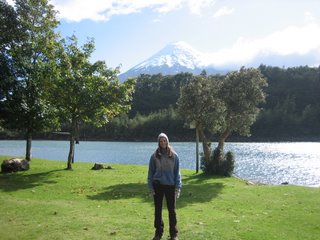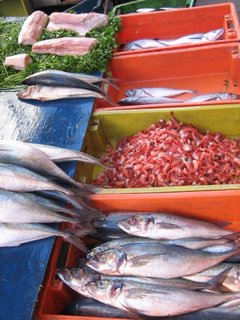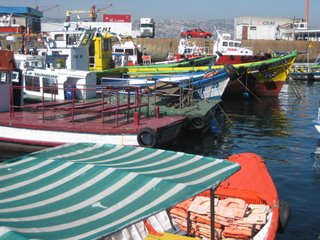
I found this passage and I really like how it was written - it doesn´t describe what is going on in Chile here, but I like how it made me feel after I read it. (However the pictures are from a recent climb with my mountaineering class).
"IT IS FALL HERE NOW, MY FAVORITE OF THE FOUR seasons. We get all four here, and they come at us under the doors, in through the windows. One morning you wake and need blankets; you take the fan out of the window to see clouds that mist out by midmorning, only to reveal a naked blue coolness like God yawning.
September is perfect Oregon. The blocks line up like postcards and the rosebuds bloom into themselves like children at bedtime. And in Portland we are proud of our roses; year after year, we are proud of them. When they are done, we sit in the parks and read stories into the air, whispering the gardens to sleep. I remember the sweet sensation of leaving, years ago, some ten now, leaving Texas for who knows where. I could not have known about this beautiful place, the Oregon I have come to love, this city of great people, this smell of coffee and these evergreens reaching up into a mist of sky, these sunsets spilling over the west hills to slide a red glow down the streets of my town. And I could not have known then that if I had been born here, I would have left here, gone someplace south to deal with horses, to get on some open land where you can see tomorrow's storm brewing over a high desert. I could not have known then that everybody, every person, has to leave, has to change like seasons; they have to or they die.

The seasons remind me that I must keep changing, and I want to change because it is God's way. All my life I have been changing. I changed from a baby to a child, from soft toys to play daggers. I changed into a teenager to drive a car, into a worker to spend some money. I will change into a husband to love a woman, into a father to love a child, change houses so we are near water, and again so we are near mountains, and again so we are near friends, keep changing with my wife, getting our love so it dies and gets born again and again, like a garden, fed by four seasons, a cycle of change. Everybody has to change, or they expire. Everybody has to leave, everybody has to leave their home and come back so they can love it again for all new reasons.
I want to keep my soul fertile for the changes, so things keep getting born in me, so things keep dying when it is time for things to die. I want to keep walking away from the person I was a moment ago, because a mind was made to figure things out, not to read the same page recurrently.
Only the good stories have the characters different at the end than they were at the beginning. And the closest thing I can liken life to is a book, the way it stretches out on paper, page after page, as if to trick the mind into thinking it isn't all happening at once.
Time has pressed you and me into a book, too, this tiny chapter we share together, this vapor of a scene, pulling our seconds into minutes and minutes into hours. Everything we were is no more, and what we will become, will become what was. This is from where story stems, the stuff of its construction lying at our feet like cut strips of philosophy. I sometimes look into the endless heavens, the cosmos of which we can't find the edge, and ask God what it means. Did You really do all of this to dazzle us? Do You really keep it shifting, rolling round the pinions to stave off boredom? God forbid Your glory would be our distraction. And God forbid we would ignore Your glory.
HERE IS SOMETHING I FOUND TO BE TRUE: YOU DON'T start processing death until you turn thirty. I live in visions, for instance, and they are cast out some fifty years, and just now, just last year I realized my visions were cast too far, they were out beyond my life span. It frightened me to think of it, that I passed up an early marriage or children to write these silly books, that I bought the lie that the academic life had to be separate from relational experience, as though God only wanted us to learn cognitive ideas, as if the heart of a man were only created to resonate with movies. No, life cannot be understood flat on a page. It has to be lived; a person has to get out of his head, has to fall in love, has to memorize poems, has to jump off bridges into rivers, has to stand in an empty desert and whisper sonnets under his breath:
I'll tell you how the sun rose A ribbon at a time...
And so my prayer is that your story will have involved some leaving and some coming home, some summer and some winter, some roses blooming out like children in a play. My hope is your story will be about changing, about getting something beautiful born inside of you, about learning to love a woman or a man, about learning to love a child, about moving yourself around water, around mountains, around friends, about learning to love others more than we love ourselves, about learning oneness as a way of understanding God. We get one story, you and I, and one story alone. God has established the elements, the setting and the climax and the resolution. It would be a crime not to venture out, wouldn't it?
It might be time for you to go. It might be time to change, to shine out.
I want to repeat one word for you:
Leave.
Roll the word around on your tongue for a bit. It is a beautiful word, isn't it? So strong and forceful, the way you have always wanted to be. And you will not be alone. You have never been alone. Don't worry. Everything will still be here when you get back. It is you who will have changed." -Donald Miller
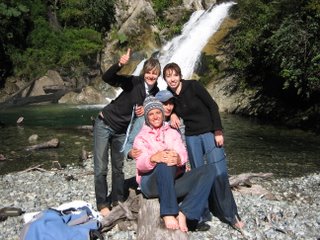 After much planning and preparation for a weekend of camping and backpacking we boarded the overnight bus headed for the south of Chile. About 14 hours later we arrived in the quaint city of Puerto Varas. From there we took a rural bus to the inside of the national park Vicente Pérez Rosales. The national park was incredible with numerous lakes and volcanoes. We decided to camp across the lake in a very rustic and small campground with an incredible view of the volcano.
After much planning and preparation for a weekend of camping and backpacking we boarded the overnight bus headed for the south of Chile. About 14 hours later we arrived in the quaint city of Puerto Varas. From there we took a rural bus to the inside of the national park Vicente Pérez Rosales. The national park was incredible with numerous lakes and volcanoes. We decided to camp across the lake in a very rustic and small campground with an incredible view of the volcano. Our group was really fun and included myself, Tim, Mark, Katy, one of my friends, Steph, from Germany, and one of Tim´s friends, Carolina, from Chile. At the onset we had decided that the trip was going to be completely in Spanish which was a necessary decision as us gringos needed to practice and the only way we could communicate with Steph and Carolina was in Spanish.
Our group was really fun and included myself, Tim, Mark, Katy, one of my friends, Steph, from Germany, and one of Tim´s friends, Carolina, from Chile. At the onset we had decided that the trip was going to be completely in Spanish which was a necessary decision as us gringos needed to practice and the only way we could communicate with Steph and Carolina was in Spanish. The best part about the trip was the place we camped because of its unique setting and because of the other people that were staying there. The campground was maintained by a old couple from Germany who also kept pigs, cows, chickens and lots of dogs. All of the animals were free to roam around and it was typical to open up your tent in the morning and be staring at a pig in the face. The other people staying there were Chileans who were there to fish in the mountain streams and rivers. We quickly made friends which was very fortunate as we spent every night circled around a bonfire with them telling jokes, sharing stories, and singing along to music with the guitar. The Chileans shared their catch with us every night as well and I don’t think I have tasted anything quite as good as fresh trout and salmon roasted in wine and onions over a makeshift grill. We also tried a traditional drink which is wine and orange juice heated over the fire.
The best part about the trip was the place we camped because of its unique setting and because of the other people that were staying there. The campground was maintained by a old couple from Germany who also kept pigs, cows, chickens and lots of dogs. All of the animals were free to roam around and it was typical to open up your tent in the morning and be staring at a pig in the face. The other people staying there were Chileans who were there to fish in the mountain streams and rivers. We quickly made friends which was very fortunate as we spent every night circled around a bonfire with them telling jokes, sharing stories, and singing along to music with the guitar. The Chileans shared their catch with us every night as well and I don’t think I have tasted anything quite as good as fresh trout and salmon roasted in wine and onions over a makeshift grill. We also tried a traditional drink which is wine and orange juice heated over the fire.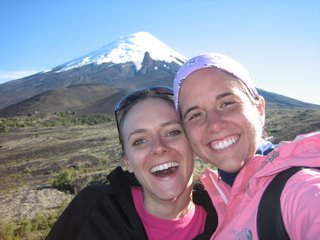 We were lucky and had very good weather. The south is known for being cold and rainy but we only had about a half an hour of rain. We were very thankful to have the sun as the temperatures were quite cold and I don’t think I took my hat off the entire weekend. During the day we went on hikes, went fishing, climbed up a good portion of a volcano, and went on a boat tour of the lakes. It was refreshing and exhilarating to be outside in a beautiful and untouched landscape.
We were lucky and had very good weather. The south is known for being cold and rainy but we only had about a half an hour of rain. We were very thankful to have the sun as the temperatures were quite cold and I don’t think I took my hat off the entire weekend. During the day we went on hikes, went fishing, climbed up a good portion of a volcano, and went on a boat tour of the lakes. It was refreshing and exhilarating to be outside in a beautiful and untouched landscape.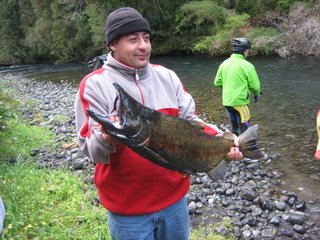 Unfortunately the four day trip had to come to an end and on Sunday night we packed up camp and invited the fishermen to dine with us in the city of Puerto Mont. After a long weekend of new friends and adventures, it was hard to get back on the bus headed back to the city filled with the reality of schoolwork and busyness, but I feel blessed that I could spend Easter with friends in the beautiful country of Chile.
Unfortunately the four day trip had to come to an end and on Sunday night we packed up camp and invited the fishermen to dine with us in the city of Puerto Mont. After a long weekend of new friends and adventures, it was hard to get back on the bus headed back to the city filled with the reality of schoolwork and busyness, but I feel blessed that I could spend Easter with friends in the beautiful country of Chile.
